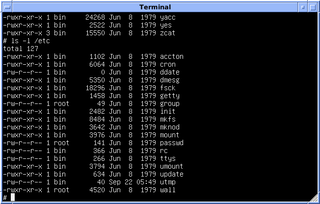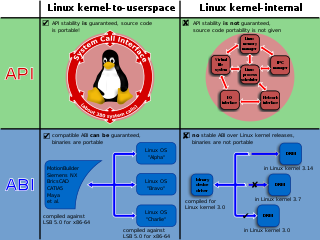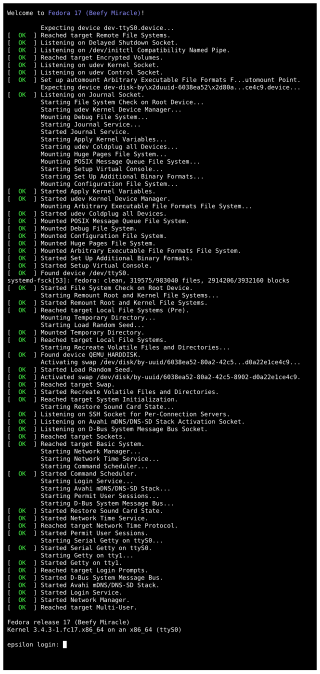Related Research Articles
XFS is a high-performance 64-bit journaling file system created by Silicon Graphics, Inc (SGI) in 1993. It was the default file system in SGI's IRIX operating system starting with its version 5.3. XFS was ported to the Linux kernel in 2001; as of June 2014, XFS is supported by most Linux distributions; Red Hat Enterprise Linux uses it as its default file system.
freedesktop.org (fd.o), formerly X Desktop Group (XDG), is a project to work on interoperability and shared base technology for free-software desktop environments for the X Window System (X11) and Wayland on Linux and other Unix-like operating systems. Although freedesktop.org produces specifications for interoperability, it is not a formal standards body.

In Unix-based computer operating systems, init is the first process started during booting of the operating system. Init is a daemon process that continues running until the system is shut down. It is the direct or indirect ancestor of all other processes and automatically adopts all orphaned processes. Init is started by the kernel during the booting process; a kernel panic will occur if the kernel is unable to start it, or it should die for any reason. Init is typically assigned process identifier 1.
Lustre is a type of parallel distributed file system, generally used for large-scale cluster computing. The name Lustre is a portmanteau word derived from Linux and cluster. Lustre file system software is available under the GNU General Public License and provides high performance file systems for computer clusters ranging in size from small workgroup clusters to large-scale, multi-site systems. Since June 2005, Lustre has consistently been used by at least half of the top ten, and more than 60 of the top 100 fastest supercomputers in the world, including the world's No. 1 ranked TOP500 supercomputer in November 2022, Frontier, as well as previous top supercomputers such as Fugaku, Titan and Sequoia.

The Linux kernel provides multiple interfaces to user-space and kernel-mode code that are used for varying purposes and that have varying properties by design. There are two types of application programming interface (API) in the Linux kernel:
- the "kernel–user space" API; and
- the "kernel internal" API.
seccomp is a computer security facility in the Linux kernel. seccomp allows a process to make a one-way transition into a "secure" state where it cannot make any system calls except exit , sigreturn , read and write to already-open file descriptors. Should it attempt any other system calls, the kernel will either just log the event or terminate the process with SIGKILL or SIGSYS. In this sense, it does not virtualize the system's resources but isolates the process from them entirely.

NetworkManager is a daemon that sits on top of libudev and other Linux kernel interfaces and provides a high-level interface for the configuration of the network interfaces.
OS-level virtualization is an operating system (OS) virtualization paradigm in which the kernel allows the existence of multiple isolated user space instances, called containers, zones, virtual private servers (OpenVZ), partitions, virtual environments (VEs), virtual kernels, or jails. Such instances may look like real computers from the point of view of programs running in them. A computer program running on an ordinary operating system can see all resources of that computer. However, programs running inside of a container can only see the container's contents and devices assigned to the container.
The Prefetcher is a component of Microsoft Windows which was introduced in Windows XP. It is a component of the Memory Manager that can speed up the Windows boot process and shorten the amount of time it takes to start up programs. It accomplishes this by caching files that are needed by an application to RAM as the application is launched, thus consolidating disk reads and reducing disk seeks. This feature was covered by US patent 6,633,968.
The following tables compare general and technical information for a number of file systems.

The EFIsystem partition or ESP is a partition on a data storage device that is used by computers that have the Unified Extensible Firmware Interface (UEFI). When a computer is booted, UEFI firmware loads files stored on the ESP to start installing operating systems and various utilities.
ext4 is a journaling file system for Linux, developed as the successor to ext3.
Upstart is a discontinued event-based replacement for the traditional init daemon—the method by which several Unix-like computer operating systems perform tasks when the computer is started. It was written by Scott James Remnant, a former employee of Canonical Ltd. In 2014, Upstart was placed in maintenance mode, and other init daemons, such as systemd, were recommended in place of Upstart. Ubuntu moved away from Upstart with the release of version 15.04 in favor of migrating to systemd. As of March 2023, there have been no updates released for Upstart since September 2014.
The multi-stage booting process of Linux is in many ways similar to the BSD and other Unix-style boot processes, from which it derives.

systemd is a software suite that provides an array of system components for Linux operating systems. The main aim is to unify service configuration and behavior across Linux distributions. Its primary component is a "system and service manager" – an init system used to bootstrap user space and manage user processes. It also provides replacements for various daemons and utilities, including device management, login management, network connection management, and event logging. The name systemd adheres to the Unix convention of naming daemons by appending the letter d. It also plays on the term "System D", which refers to a person's ability to adapt quickly and improvise to solve problems.

OpenZFS is an open-source implementation of the ZFS file system and volume manager initially developed by Sun Microsystems for the Solaris operating system and now maintained by the OpenZFS Project. It supports features like data compression, data deduplication, copy-on-write clones, snapshots, and RAID-Z. It also supports the creation of virtual devices, which allows for the creation of file systems that span multiple disks.
ZFS is a file system with volume management capabilities. It began as part of the Sun Microsystems Solaris operating system in 2001. Large parts of Solaris – including ZFS – were published under an open source license as OpenSolaris for around 5 years from 2005 before being placed under a closed source license when Oracle Corporation acquired Sun in 2009–2010. During 2005 to 2010, the open source version of ZFS was ported to Linux, Mac OS X and FreeBSD. In 2010, the illumos project forked a recent version of OpenSolaris, including ZFS, to continue its development as an open source project. In 2013, OpenZFS was founded to coordinate the development of open source ZFS. OpenZFS maintains and manages the core ZFS code, while organizations using ZFS maintain the specific code and validation processes required for ZFS to integrate within their systems. OpenZFS is widely used in Unix-like systems.
Bcachefs is a copy-on-write (COW) file system for Linux-based operating systems. Its primary developer, Kent Overstreet, first announced it in 2015, and it will be added to the Linux kernel beginning with 6.7. It is intended to compete with the modern features of ZFS or Btrfs, and the speed and performance of ext4 or XFS. It self-describes as "stable", as of December 2022.
References
- ↑ Jonathan Corbet (2005-10-12). "Adaptive file readahead". LWN.net . Retrieved 2014-08-20.
- ↑ "readahead(2) - Linux manual page". man7.org. Retrieved 2014-04-09.
- ↑ Michael Opdenacker (2007-06-15). "Readahead: time-travel techniques for desktop and embedded systems" (PDF). free-electrons.com. pp. 5–6. Retrieved 2014-05-01.
- ↑ "Readahead". fedorahosted.org. Retrieved 2014-04-09.
- ↑ "systemd-readahead-replay.service". freedesktop.org. 2014-03-26. Archived from the original on 2014-04-09. Retrieved 2014-04-09.
- ↑ "systemd/systemd – System and Session Manager: Changes with 217". cgit.freedesktop.org. Retrieved 2018-02-09.
- ↑ Krzysztof Lichota (2008). "Linux solution for prefetching necessary data during application and system startup" (PDF). code.google.com. Archived from the original (PDF) on 2009-12-11. Retrieved 2014-07-28.
- ↑ "bcache.txt\Documentation - linux-bcache.git - Unnamed repository; edit this file 'description' to name the repository". evilpiepirate.org. Retrieved 1 May 2020.
- ↑ "Part 10 - Monitoring and Tuning ZFS Performance| Oracle Community". community.oracle.com. Retrieved 1 May 2020.